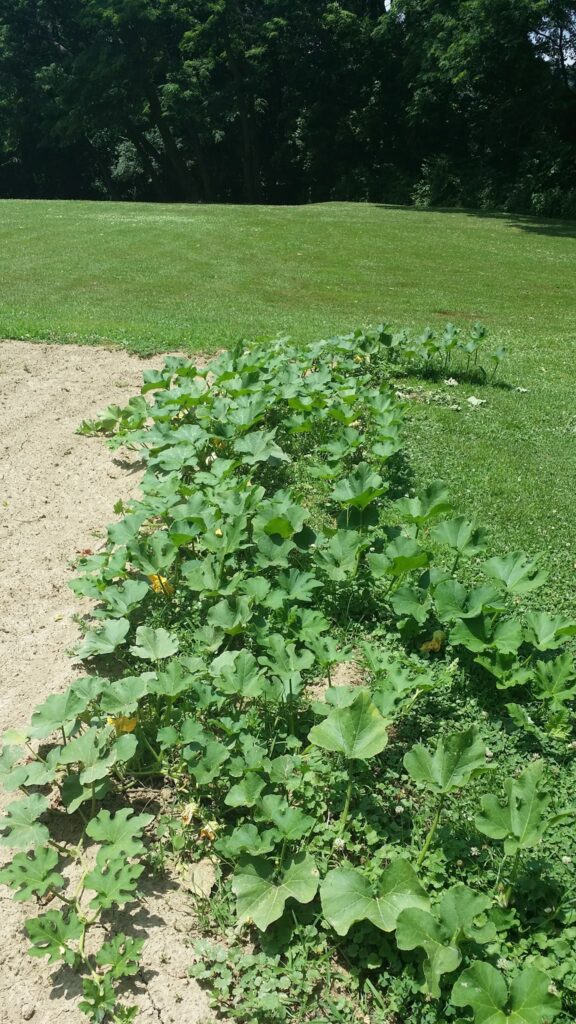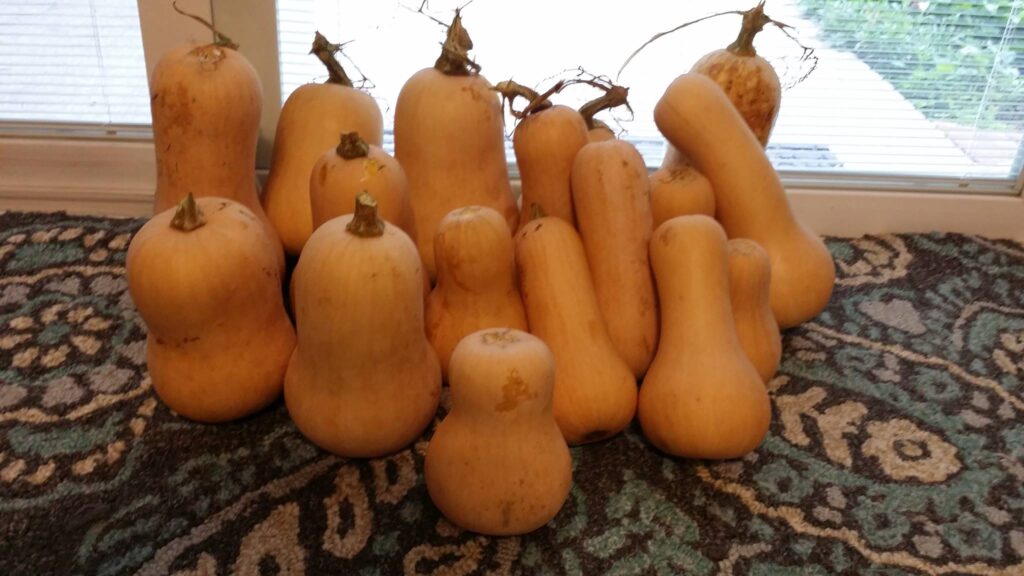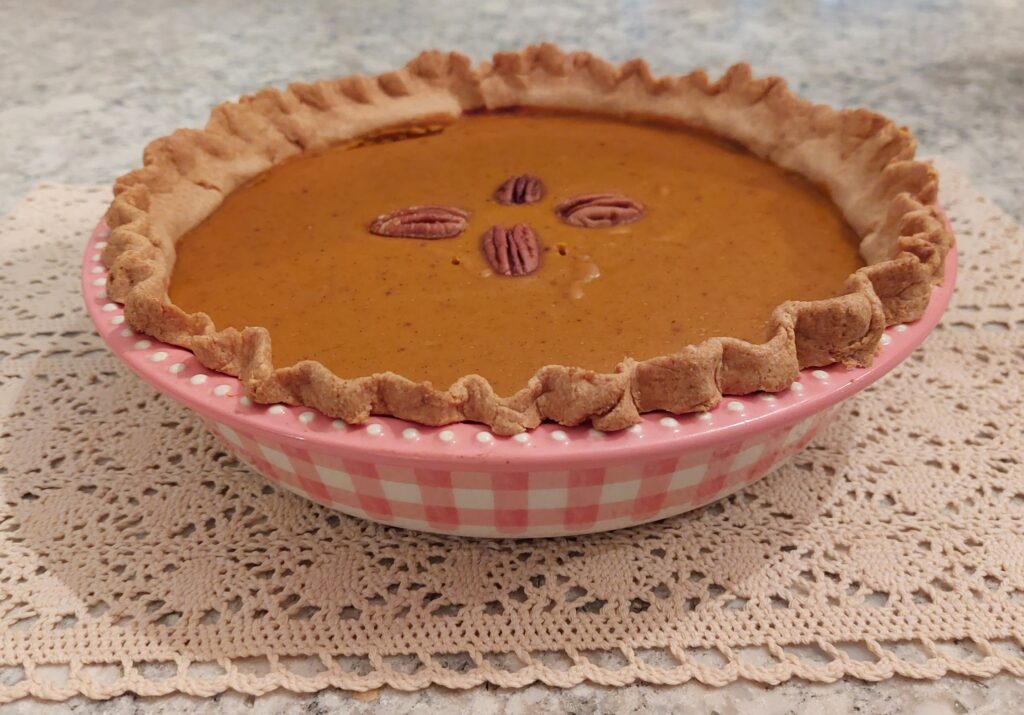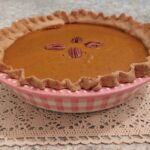Butternut Squash Pie
The harvest of butternut squash is storing well for winter and I’m using one today to develop a butternut squash pie for my family, Thanksgiving Day. God’s design for this winter squash is something to be admired. The skin hardens to protect the flesh inside and it stays well protected for months.
It gets so hard, I don’t even bother to peel it when I’m ready to use it! Instead, I place it on a baking sheet to bake at 350 degrees. After about 45 minutes in the oven, I let it cool until it’s ready to handle.

Benefits of This Butternut Squash Pie
- The pie is naturally sweet so you and I can use less sugar.
- It tastes like pumpkin pie, so you won’t need a store-bought unknown source of pumpkin to bake with, you can create your own.
- It’s super easy to make!
- It has the same antioxidant benefits of all butternut squash recipes. They have beta-carotene and A-carotenoids. This is helpful to deter macular degeneration and cataracts and help protect the epithelium (the inner lining of our blood vessels). We need all the heart protection we can get.
- One cup has a large amount of vitamin A (212%), some C (35%), B6 (10%), and a little potassium and magnesium.
- God’s plan for your physical health is evident in the things He created. We see this every time we read how many vitamins, minerals, and antioxidants are placed in the plants and what they do for our bodies! On the other hand, we know man’s ultra-processed items destroy the cells and cause chronic disease.
- Let’s get our families away from that practice and towards a less toxic cooking experience.

He has caused his wondrous works to be remembered;
the Lord is gracious and merciful.
He provides food for those who fear him;
he remembers his covenant forever.Psalm 111:4-6 ESV – He has caused his wondrous works to be – Bible Gateway

Recipe for Butternut Squash Pie
Butternut Squash Pie

- 2 Cups Butternut (Prebaked)
- 1/4 Cup Unsweetened Vanilla Almond Milk
- 3 Eggs
- 3 ounces Maple Syrup
- 1 Pinch All natural Stevia
- 2 Teaspoons Pumpkin Pie Spice
- 1 Fresh-Milled Pie Crust
Fresh-Milled Pie Crust
- 1 1/2 Cups Fresh-milled grain (soft white)
- 6 tbsp butter or 1/4 cup olive oil
- 1/2 tsp stevia syrup (optional)
- 1 tsp salt
- 9 tbsp water
-
To make your pie crust, mix the salt with the flour, cut the butter into the flour until it looks like crumbles. Add the stevia syrup (homemade stevia is 1/2 tsp, store bought is just a couple of drops because it's much more concentrated). to the water
-
Add the water, start with 6 tsp, depending on humidity, it may need more. You'll know if it looks dry and it not forming a ball to add more. Roll it out and cover your pie dish.
The Pie Filling
-
In a large mixing bowl combine your butternut squash with the spices, maple, syrup, eggs, and milk, and a pinch of stevia. Mix all ingredients together until well blended.
-
Pour into the pie crust and bake about 30 minutes, checking with a toothpick to make sure it comes out clean. Cool and serve!
**The nutrition facts for the fresh-milled pie crust are not in the nutrition calculator system, so there is more fiber in the fresh-milled pie crust than what is displayed.***
I hope you give this zero refined sugar pie a try for your holiday! I love developing recipes from God’s garden goodness, He supplies such abundance and gives so much thought and care into what we need, it is easy to be thankful!
If you are looking for other recipes using your butternut squash here is another one you might like! I do an entire workshop on using butternut squash too, so look at my booking a workshop page to see if you and a few friends might want a girl’s night out to enjoy this creative workshop!
I look forward to serving you and offering you add free recipes and browsing on this site! Share this recipe with a friend or on your social media so others can be encouraged too!
References:
Tang G. Bioconversion of dietary provitamin A carotenoids to vitamin A in humans. Am J Clin Nutr. 2010 May;91(5):1468S-1473S. doi: 10.3945/ajcn.2010.28674G. Epub 2010 Mar 3. PMID: 20200262; PMCID: PMC2854912.